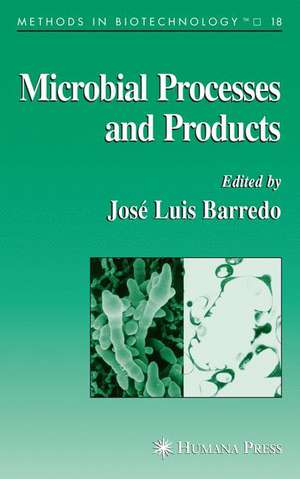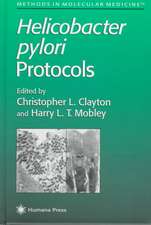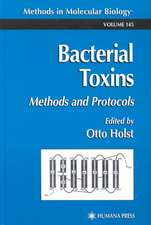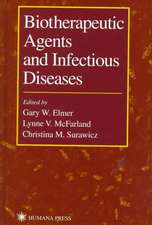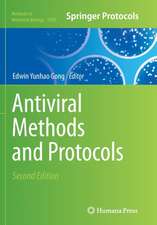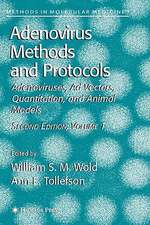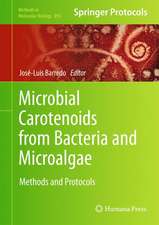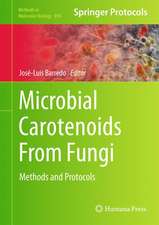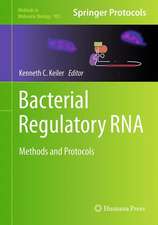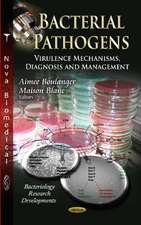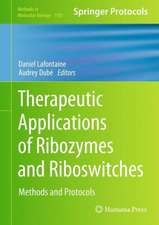Microbial Processes and Products: Methods in Biotechnology, cartea 18
Editat de José-Luis Barredoen Limba Engleză Hardback – 7 feb 2005
| Toate formatele și edițiile | Preț | Express |
|---|---|---|
| Paperback (1) | 954.45 lei 6-8 săpt. | |
| Humana Press Inc. – 19 noi 2010 | 954.45 lei 6-8 săpt. | |
| Hardback (1) | 963.15 lei 6-8 săpt. | |
| Humana Press Inc. – 7 feb 2005 | 963.15 lei 6-8 săpt. |
Din seria Methods in Biotechnology
- 15%
 Preț: 648.74 lei
Preț: 648.74 lei - 15%
 Preț: 656.43 lei
Preț: 656.43 lei - 15%
 Preț: 650.69 lei
Preț: 650.69 lei - 15%
 Preț: 639.90 lei
Preț: 639.90 lei - 18%
 Preț: 953.52 lei
Preț: 953.52 lei - 18%
 Preț: 969.93 lei
Preț: 969.93 lei - 18%
 Preț: 954.14 lei
Preț: 954.14 lei - 18%
 Preț: 952.57 lei
Preț: 952.57 lei - 18%
 Preț: 961.23 lei
Preț: 961.23 lei - 15%
 Preț: 652.31 lei
Preț: 652.31 lei - 15%
 Preț: 651.19 lei
Preț: 651.19 lei - 18%
 Preț: 953.52 lei
Preț: 953.52 lei - 18%
 Preț: 962.35 lei
Preț: 962.35 lei - 18%
 Preț: 955.56 lei
Preț: 955.56 lei - 15%
 Preț: 649.87 lei
Preț: 649.87 lei - 18%
 Preț: 964.71 lei
Preț: 964.71 lei - 15%
 Preț: 648.05 lei
Preț: 648.05 lei - 15%
 Preț: 632.66 lei
Preț: 632.66 lei - 15%
 Preț: 643.99 lei
Preț: 643.99 lei
Preț: 963.15 lei
Preț vechi: 1174.58 lei
-18% Nou
Puncte Express: 1445
Preț estimativ în valută:
184.32€ • 200.15$ • 154.83£
184.32€ • 200.15$ • 154.83£
Carte tipărită la comandă
Livrare economică 22 aprilie-06 mai
Preluare comenzi: 021 569.72.76
Specificații
ISBN-13: 9781588295484
ISBN-10: 1588295486
Pagini: 532
Ilustrații: XIV, 516 p.
Dimensiuni: 155 x 235 x 38 mm
Greutate: 0.95 kg
Ediția:2005
Editura: Humana Press Inc.
Colecția Humana
Seria Methods in Biotechnology
Locul publicării:Totowa, NJ, United States
ISBN-10: 1588295486
Pagini: 532
Ilustrații: XIV, 516 p.
Dimensiuni: 155 x 235 x 38 mm
Greutate: 0.95 kg
Ediția:2005
Editura: Humana Press Inc.
Colecția Humana
Seria Methods in Biotechnology
Locul publicării:Totowa, NJ, United States
Public țintă
ResearchCuprins
Development of Improved Strains and Optimization of Fermentation Processes.- Experimental Design in Microbiology.- Metabolic Engineering of Acremonium chrysogenum to Produce Deacetoxycephalosporin C and Bioconversion to 7-Aminodeacetoxycephalosporanic Acid.- Production of Erythromycin With Saccharopolyspora erythraea.- The Phenylacetyl-CoA Catabolon.- Recombinant Microorganisms for the Biosynthesis of Glycosylated Antitumor Compounds.- Assay Methods for Detection and Quantification of Antimicrobial Metabolites Produced by Streptomyces clavuligerus.- Purification of Plasmid DNA Vectors Produced in Escherichia coli for Gene Therapy and DNA Vaccination Applications.- Genome Breeding of an Amino Acid-Producing Corynebacterium glutamicum Mutant.- Metabolic Activity Profiling by 13C Tracer Experiments and Mass Spectrometry in Corynebacterium glutamicum.- Protein and Vitamin Production in Bacillus megaterium.- Strategies for Large-Scale Production of Recombinant Proteins in Filamentous Fungi.- Strain and Culture Conditions Improvement for ?-Carotene Production With Mucor.- Xanthophylls in Fungi.- Methodologies for the Analysis of Fungal Carotenoids.- Insertional Mutagenesis in the Vitamin B2 Producer Fungus Ashbya gossypii.- Improved Polysaccharide Production Using Strain Improvement.- Use of the Morganella morganii phoC Gene as Reporter in Bacterial and Yeast Hosts.- Gene Expression Arrays in Food.- Optimization of Proteome Analysis for Wine Yeast Strains.- Bacteriocin-Producing Strains in a Meat Environment.- In Vitro and In Vivo Interactions of Nonpathogenic Bacteria With Immunocompetent Cells.- Volatile Sulfur Detection in Fermented Foods.- Bioleaching.- Use of PhoN Phosphatase to Remediate Heavy Metals.- Safe Dispatch and Transport of Biological Material.- How to DepositBiological Material for Patent Purposes.- Laws and Regulations for the Protection of Biotechnological Inventions.
Recenzii
Microbial Processes and Products is the latest in the series Methods in Biotechnology™, some issues of which have been highly focused and widely relevant (such as Enzymes in Nonaqueous Solvents, Vulfson et al., 2001). This volume (and indeed the entire series) is targeted to the research community. Those researchers finding a relevant chapter in this text are likely to be rewarded. As the series title suggests, this is a 'methods' volume and the sections are packed with detailed protocols, tips and useful practical advice. The text is generally readable and the chapters are well referenced. -Don Cowan, University of the Western Cape
"...the sections are packed with detailed protocols, tips, and useful practical advice." - Microbiology Today
"...the sections are packed with detailed protocols, tips, and useful practical advice." - Microbiology Today
Textul de pe ultima copertă
The development of recombinant DNA techniques over the last 20 years has greatly expanded the opportunities for using microorganisms to produce a broad range of valuable substances. In Microbial Processes and Products, outstanding leaders in using microorganisms as cell factories describe in detail their best laboratory procedures for many processes and products mediated by microorganisms. An overview chapter describes how to develop strain improvement programs and strategies to optimize fermentation processes. Taking advantage of the most recent developments in such processes, the authors offer step-by-step experimental methods for the optimal design of microbial metabolite production, including semisynthetic derivatives of cephalosporins, erythromycin, antitumor compounds, plasmids for gene therapy and DNA vaccination, L-lysine, vitamins B2 and B12, the sweet-tasting protein thaumatin, the carotenoids b-carotene and astaxanthin, the polysaccharide gellan, and bacteria-producing bacteria for sausage fermentation. Additionally, the use of phenylacetyl-CoA catabolon for enzymatic synthesis of penicillins, aromatic biotransformations, synthesis of new bioplastics, biosensor design, or synthesis of drug vehicles, and the development of a phosphate encoding gene as a reporter and to monitor gene expression are illustrated.
The diverse chemicals and biochemicals produced can be used in human health, nutrition, and environmental protection. Additional chapters offer techniques for analysis of antimicrobial metabolites and carotenoids, volatile sulfur compounds, metabolic pathway fluxes, gene expression arrays, proteome analysis, bacterial modulation of the innate immune response, bioleaching activity, and heavy metal remediation. Finally, three overview chapters on transport of biological material, deposit of biological material for patent purposes, and protection of biotechnological inventions are shown. The protocols follow the successful Methods in Biotechnology™ series format, each offering step-by-step laboratory instructions, an introduction outlining the principle behind the technique, lists of the necessary equipment and reagents, and tips on troubleshooting and avoiding known pitfalls. A companion volume, Microbial Enzymes and Biotransformations, describes in detail cutting-edge techniques for the screening, evolution, production, immobilization, and use of enzymes.
Wide-ranging and practical, Microbial Processes and Products offers laboratory and industrial scientists a wealth of readily reproducible techniques for the successful microbial generation of biochemical products to serve the needs of human health, nutrition, and environmental protection.
The diverse chemicals and biochemicals produced can be used in human health, nutrition, and environmental protection. Additional chapters offer techniques for analysis of antimicrobial metabolites and carotenoids, volatile sulfur compounds, metabolic pathway fluxes, gene expression arrays, proteome analysis, bacterial modulation of the innate immune response, bioleaching activity, and heavy metal remediation. Finally, three overview chapters on transport of biological material, deposit of biological material for patent purposes, and protection of biotechnological inventions are shown. The protocols follow the successful Methods in Biotechnology™ series format, each offering step-by-step laboratory instructions, an introduction outlining the principle behind the technique, lists of the necessary equipment and reagents, and tips on troubleshooting and avoiding known pitfalls. A companion volume, Microbial Enzymes and Biotransformations, describes in detail cutting-edge techniques for the screening, evolution, production, immobilization, and use of enzymes.
Wide-ranging and practical, Microbial Processes and Products offers laboratory and industrial scientists a wealth of readily reproducible techniques for the successful microbial generation of biochemical products to serve the needs of human health, nutrition, and environmental protection.
Caracteristici
Includes supplementary material: sn.pub/extras
